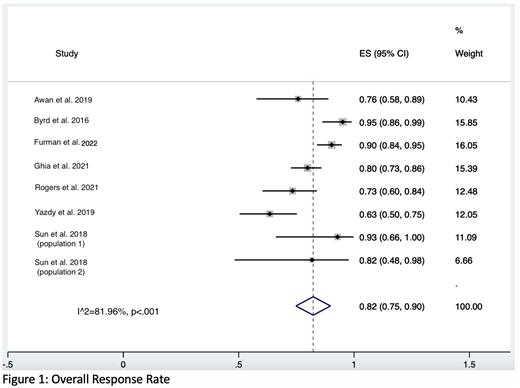Background
Chronic Lymphocytic Leukemia (CLL) is the most prevalent adult leukemia and is characterized by the accumulation of small and mature appearing lymphocytes in blood, lymphoid tissue, and bone marrow. Chemoimmunotherapy and targeted therapies can improve overall survival and the duration of remission; however, CLL is prone to relapse, therefore identifying new therapeutic targets has been an important aspect of CLL research and management. B-cell receptor signaling serves an integral role in the pathogenesis of CLL and kinases involved in the BCR pathway are targets of novel therapies. The Bruton tyrosine kinase (BTK) that is immediately downstream of the B-cell receptor is a mediator of cell signaling involved in B cell survival and proliferation. Moreover, BTK is involved in CLL interaction with the tumor microenvironment. Targeting BTK with ibrutinib was a transformative advance in CLL treatment and has become a front-line therapy in the management of CLL. In recent years, newer generations of Bruton tyrosine kinase inhibitors (BTKi) have been approved in the management of CLL. Acalabrutinib is an irreversible, second generation BTKi that is more selective and potent than ibrutinib. This meta-analysis investigated the efficacy, outcomes, and hematologic adverse effects of acalabrutinib in the treatment of relapsed/refractory CLL.
Methods
A search was conducted using the PICOS model and PRISMA guidelines to retrieve outcome, efficacy, and adverse effect data. 12 studies were chosen after literature review and screening. In the event a study was an abstract or paper providing updated data on the same patient population of a previously published study, the most up to date information was used for analysis. The random effect meta-analysis model was used for analyses. Variables for analysis were: Overall Response Rate (ORR), Overall Discontinuation Rate, Death Rate, and Discontinuation due to Adverse Effects. Grade 3 Hematologic adverse reactions were analyzed: Anemia, Neutropenia, Thrombocytopenia.
Results
The analysis included a total of 796 patients (450 Males & 200 females; sum discrepancy due to absence of certain demographic information in particular studies). ORR pooled estimate: 82% (95% CI [0.82,0.75]; p<.001, I 2=81.96%), death rate: 12% (95% CI [0.06,0.19]; p<.001, I 2=87.23%), overall discontinuation rate: 35% (95% CI [0.20, 0.30]; p< .001, I 2=98.84%), discontinuation due to adverse effect: 13% (95% CI [0.10,0.15]; p=0.6, I 2=0.00), neutropenia: 18% (95% CI [0.15,0.20]; p=0.70), anemia: 9% (95% CI [0.06,0.12];p=0.18), thrombocytopenia: 7% (95% CI [0.04,0.11];p=0.09).
Discussion
BTK inhibitors have significantly changed the management of CLL and are utilized as either as frontline or as salvage treatment. Although, ibrutinib has shown efficacy in management of CLL, off-target toxicities and treatment resistance has been demonstrated with its use. Therefore, a greater understanding of second generation BTK inhibitors such as acalabrutinib will offer clinicians perspective in choosing a CLL management strategy. Our meta-analyses noted an ORR pooled estimate of 82% with a death rate of 12%. Deaths in the literature typically occurred either from disease progression or adverse effects. Similarly, discontinuation typically occurred due to progressive disease or adverse events. The Grade 3 hematologic adverse effects most frequently reported were anemia, thrombocytopenia, neutropenia. Clinical Grade 3 adverse effects (e.g. pneumonia, cardiac events) and baseline characteristics will be focused on in a future analysis.
Disclosures
Akhtari:Abbvie: Honoraria; J&J: Speakers Bureau; Incyte: Speakers Bureau; BMS: Membership on an entity's Board of Directors or advisory committees, Speakers Bureau; CTI: Speakers Bureau; JazzPharma: Speakers Bureau; Sobi: Honoraria; SecuraBio: Speakers Bureau; Incyte: Speakers Bureau; Karyopharm: Speakers Bureau; PharmaEssentia: Speakers Bureau.


This feature is available to Subscribers Only
Sign In or Create an Account Close Modal